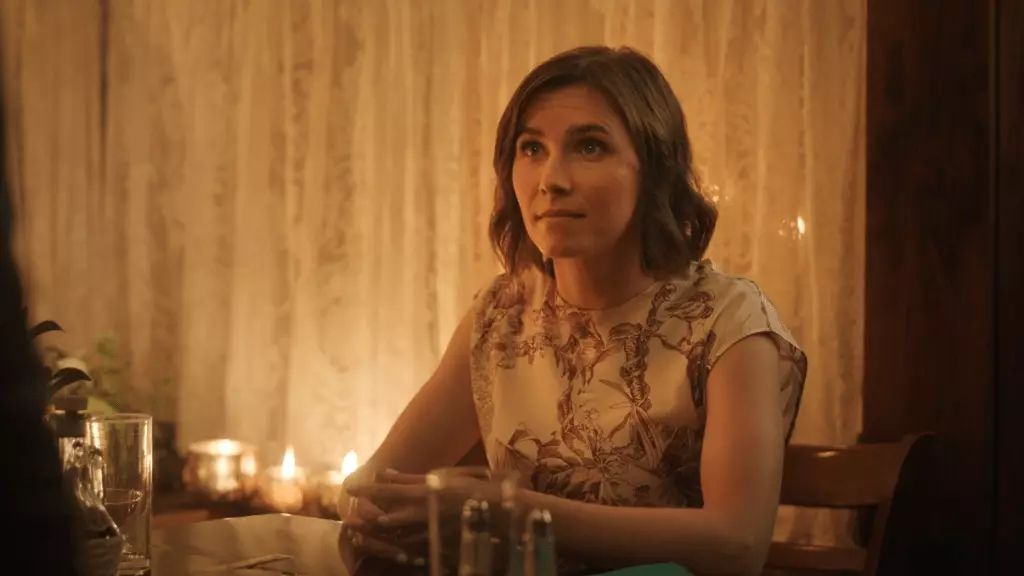Peacock’s *Laid* has made quite an impression, culminating its first season with a finale that not only entertains but also evokes profound emotional responses. Engaging a talented array of guest stars like Finneas O’Connell, Simu Liu, and Chloe Fineman, the show manages to push the boundaries of a dark romantic comedy while incorporating real-life narratives that resonate with its audience. The season finale specifically stands out, particularly due to Zosia Mamet’s allusion to her scene with Amanda Knox, further tying fictional storytelling with genuine experiences that challenge societal narratives.
Zosia Mamet’s exposure to Amanda Knox in *Laid* raises intriguing questions about privacy and storytelling ethics. As she emphasized in her discussions, the production team took meticulous measures to ensure their environment was respectful and contained, mirroring the very essence of the stories they wished to tell. The sensitivity surrounding Knox’s real-life experiences, particularly her wrongful conviction for a crime she did not commit, highlights the struggle of balancing entertainment with ethical storytelling.
Mamet describes Knox as a “force,” indicating that such real-life encounters can significantly enrich the creative process. This relationship illustrates the potential for crossover between real trauma and fictional representation. Rather than exploiting Knox’s past for shock value, *Laid* aims to treat such narratives with profound respect, reinforcing the idea that true stories can contribute deeply to the fabric of comedy while still retaining their weight.
At the heart of *Laid* lies the exploration of female friendships, particularly between Ruby Yao, played by Stephanie Hsu, and her best friend AJ, portrayed by Mamet. In a world that often elevates romantic relationships above platonic ones, the series offers a refreshing perspective by focusing on the significance of friendships among women, especially as they navigate adulthood. Mamet’s remarks about the deeper connections that female friendships can embody resonate throughout the series, illustrating that these bonds can be far more significant than fleeting romantic entanglements.
Mamet has illuminated that as individuals age, they may encounter painful realities where friendships either evolve or dissolve. *Laid* captures this transitioning phase adeptly, particularly through a pivotal moment where Ruby’s indiscretion jeopardizes her relationship with AJ, creating a fracture in their otherwise supportive connection. This plot twist serves not only as a comedic highpoint but also as a stark reminder of how valuable and vulnerable friendships can be, and how easily they can be disrupted by poor choices.
A noteworthy achievement of *Laid* is its ability to weave humor into themes of death and loss. The central premise—that Ruby’s past sexual partners are dying in the order she had relationships with them—invites a unique blend of comedic scenarios amidst an otherwise serious backdrop. It cleverly posits questions of mortality, legacy, and the often-hilarious aspects of life’s darker themes. In doing so, it challenges audiences to confront uncomfortable subjects while still finding moments of levity.
This juxtaposition of humor and weighty issues creates a more profound viewing experience, resonating with those who have observed or experienced similar relational dynamics. The show succeeds in provoking reflection while simultaneously eliciting laughter, thus embodying the complexities of life’s journey.
As the first season wraps up, audiences are left eager for the continuation of Ruby and AJ’s journey. The combination of compelling character development and exploration of poignant themes ensures that *Laid* will have a lasting impact beyond its inaugural season. By focusing on female friendship, ethical storytelling, and the duality of humor amidst serious circumstances, the series paves the way for fuller, richer narratives in future seasons.
In hindsight, *Laid* exemplifies the balance of entertainment with heartfelt storytelling, pushing viewers to contemplate not just the absurdities of life and relationships, but also the intricacies that come forth when we embrace vulnerability, friendship, and growth.
